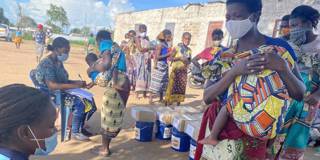With its population growth continuing to outpace the expansion of education and employment possibilities for young people, Mozambique is still far from seizing its demographic opportunity. But given the right policy mix, the country can accelerate fertility decline and realize large and sustained economic dividends.
MAPUTO – Mozambique often makes international headlines these days because of its frequent cyclones and the worsening conflict in the north of the country. But, much like Southeast Asian economies in the 1980s and 1990s, the country has a chance to seize a demographic window of opportunity, stimulate economic growth, and sustain a sizeable middle-class workforce. Fulfilling this promise, and avoiding less favorable outcomes, will require rapid large-scale investment in Mozambique’s young people.
With fertility declining only gradually, Mozambique’s population is projected to double between now and 2050, to 60 million, of whom 55% will be under 25. But Mozambique is still far from seizing its demographic opportunity, because population growth continues to outpace the expansion of education and employment possibilities for young people. The United Nations Population Fund (UNFPA) estimates that the number of 15-24-year-olds who were neither employed nor in education increased by one million – thus more than doubling – in the decade between the 2007 and 2017 censuses.
But with the right policy mix, Mozambique can accelerate its demographic transition and realize large and sustained economic dividends. Specifically, concurrently emphasizing job-oriented economic reforms and investments in family planning and education could result in a GDP per capita of more than $8,000 by 2051, similar to that of an upper-middle-income country like South Africa or Namibia. Compared to that outcome, a business-as-usual scenario without such investments would cost the country $6,000 per capita in foregone GDP. Mozambique would also face the economic and social costs associated with higher public debt, additional strain on an already overstretched health system, lower productivity, and higher youth unemployment.

MAPUTO – Mozambique often makes international headlines these days because of its frequent cyclones and the worsening conflict in the north of the country. But, much like Southeast Asian economies in the 1980s and 1990s, the country has a chance to seize a demographic window of opportunity, stimulate economic growth, and sustain a sizeable middle-class workforce. Fulfilling this promise, and avoiding less favorable outcomes, will require rapid large-scale investment in Mozambique’s young people.
With fertility declining only gradually, Mozambique’s population is projected to double between now and 2050, to 60 million, of whom 55% will be under 25. But Mozambique is still far from seizing its demographic opportunity, because population growth continues to outpace the expansion of education and employment possibilities for young people. The United Nations Population Fund (UNFPA) estimates that the number of 15-24-year-olds who were neither employed nor in education increased by one million – thus more than doubling – in the decade between the 2007 and 2017 censuses.
But with the right policy mix, Mozambique can accelerate its demographic transition and realize large and sustained economic dividends. Specifically, concurrently emphasizing job-oriented economic reforms and investments in family planning and education could result in a GDP per capita of more than $8,000 by 2051, similar to that of an upper-middle-income country like South Africa or Namibia. Compared to that outcome, a business-as-usual scenario without such investments would cost the country $6,000 per capita in foregone GDP. Mozambique would also face the economic and social costs associated with higher public debt, additional strain on an already overstretched health system, lower productivity, and higher youth unemployment.